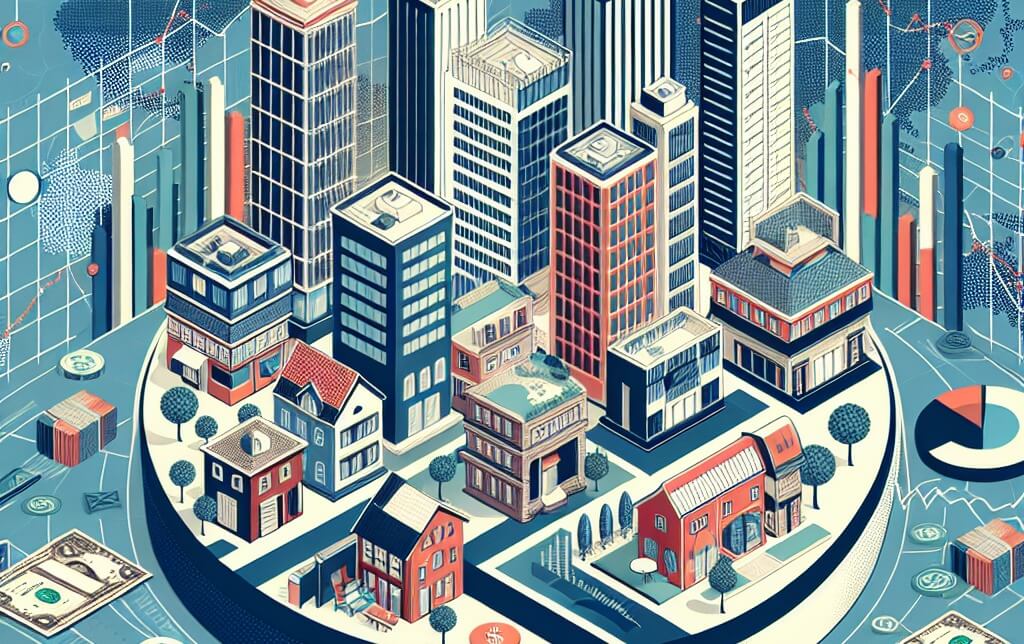
Tokenized Real Estate: Revolutionizing Property Investment
Tokenized real estate is undeniably revolutionizing property investment by introducing a groundbreaking approach to accessing and investing in real estate assets. Through the use of blockchain technology, real estate properties are divided into digital tokens that can be bought, sold, and traded on a decentralized platform. This innovation has significantly lowered the barrier to entry for individual investors, allowing them to diversify their investment portfolios with fractional ownership of high-value properties. Additionally, tokenization provides increased liquidity, transparency, and security in real estate transactions, paving the way for a more efficient and accessible investment landscape. As the adoption of tokenized real estate continues to grow, it is reshaping the traditional real estate market and democratizing access to lucrative property investment opportunities.
1. Introduction to Tokenized Real Estate
Tokenized real estate refers to the process of digitizing ownership of real estate assets into tokens on a blockchain, enabling fractional ownership and increased liquidity in the real estate market. This innovative concept merges traditional real estate investments with blockchain technology, allowing investors to purchase and trade fractional ownership of properties with ease and security. By tokenizing real estate assets, the barriers to entry for investing in high-value properties are significantly reduced, making real estate investment more accessible to a broader range of investors. The utilization of smart contracts ensures transparency and efficiency in transactions, while also providing a secure platform for asset management. Overall, tokenized real estate presents a promising opportunity for investors to diversify their portfolios and participate in the real estate market in a more efficient and inclusive manner.
- Definition of tokenized real estate
Tokenized real estate refers to the process of converting real estate assets into digital tokens on a blockchain platform. These tokens represent ownership or investment in a specific property, allowing investors to buy, sell, or trade fractions of real estate assets in a secure and transparent manner. By tokenizing real estate, the traditional barriers to entry, such as high investment requirements and lack of liquidity, are significantly reduced. This innovative approach to real estate investment provides greater accessibility, efficiency, and liquidity for investors, while also streamlining the process of property ownership and management.
- Overview of the concept and its significance
Tokenized real estate is a concept that involves digitizing and dividing real estate assets into tokens that can be bought, sold, and traded on a blockchain-based platform. This innovative approach aims to increase liquidity in the real estate market by allowing investors to own fractions of high-value properties, making real estate investment more accessible to a wider range of individuals. The significance of tokenized real estate lies in its ability to democratize investment opportunities, reduce barriers to entry, and provide greater transparency and security through the use of blockchain technology. This concept has the potential to revolutionize the real estate industry by streamlining transactions, increasing market efficiency, and opening up new avenues for investment in the digital age.
- How tokenization is transforming the real estate industry
Tokenization is revolutionizing the real estate industry by providing a more accessible and efficient method for investing in properties. Through the issuance of digital tokens representing ownership of real estate assets, investors can now participate in fractional ownership of high-value properties, which were previously out of reach for many individuals. This democratization of real estate investment allows for increased liquidity, reduced transaction costs, and improved transparency in the market. Furthermore, tokenization enables instant and secure transactions through blockchain technology, eliminating the need for intermediaries and streamlining the investment process. Overall, tokenization is reshaping the real estate industry by making it more inclusive, liquid, and transparent for investors worldwide.
2. Understanding Tokenization
Tokenization refers to the process of converting assets, such as real estate, into digital tokens on a blockchain. This process allows for the fractional ownership of traditionally illiquid assets, opening up new opportunities for investors to diversify their portfolios. In the context of tokenized real estate, each token represents a share of the property, enabling individuals to invest in real estate with lower entry barriers and increased liquidity. By tokenizing real estate, owners can unlock the value of their properties and attract a wider pool of investors, while investors can access a new asset class with reduced costs and greater flexibility. Overall, understanding tokenization is crucial for navigating the evolving landscape of real estate investment and capital markets.
- Definition and explanation of tokenization
Tokenization in the context of real estate refers to the process of converting ownership rights of a property into digital tokens on a blockchain. These tokens represent a share or fraction of the property's value, allowing investors to own a portion without having to buy the entire property. Tokenization provides a way to fractionalize real estate assets, making them more accessible to a wider range of investors. Each token is unique, traceable, and secure due to the blockchain technology used for the transaction. This method enhances liquidity in the real estate market by enabling investors to buy and sell these tokens easily, thus democratizing access to real estate investment opportunities.
- Differentiating between fungible and non-fungible tokens
In the realm of tokenized real estate, it is imperative to discern between fungible and non-fungible tokens. Fungible tokens are interchangeable and hold equal value, allowing for seamless exchange and transferability within a given network. Conversely, non-fungible tokens represent unique assets with distinct properties, making each token irreplaceable and non-interchangeable. In the context of tokenized real estate, fungible tokens could represent fractional ownership of a property, where each token holds the same value as others in the same category. On the other hand, non-fungible tokens could be utilized to represent ownership of a specific property, with each token uniquely identifying a particular real estate asset. Understanding the distinctions between fungible and non-fungible tokens is crucial for investors and stakeholders in navigating the complexities of tokenized real estate transactions.
- Role of blockchain technology in tokenization
Blockchain technology plays a pivotal role in the process of tokenization, particularly in the context of tokenized real estate. By leveraging blockchain's immutable and decentralized nature, tokenization allows for the fractional ownership of real estate assets through the issuance of digital tokens. These tokens represent a share of the underlying property and are recorded on a blockchain, providing transparency, security, and efficiency in the trading and transfer of ownership. The use of blockchain technology ensures that ownership records are tamper-proof and accessible to all relevant parties, thereby streamlining the process of investing in real estate and unlocking liquidity in traditionally illiquid assets. Additionally, smart contracts can automate various aspects of tokenized real estate transactions, such as dividends distribution and compliance with regulatory requirements, further enhancing the benefits of blockchain technology in the tokenization process.
3. Tokenized Real Estate vs Traditional Real Estate
Tokenized real estate refers to the process of converting real estate assets into digital tokens on a blockchain. This innovative approach offers several advantages over traditional real estate transactions. Firstly, tokenization allows for fractional ownership, enabling investors to purchase smaller portions of high-value properties. This increased liquidity and accessibility open up real estate investments to a broader range of individuals. Additionally, the use of blockchain technology enhances transparency and security in transactions, reducing the need for intermediaries and streamlining the process. Tokenized real estate also provides greater flexibility in terms of buying, selling, and trading assets, offering a more dynamic and efficient investment landscape compared to traditional real estate markets.
- Comparing tokenized real estate with traditional real estate
When comparing tokenized real estate with traditional real estate, several key differences emerge. Tokenized real estate involves the fractional ownership of real estate assets through blockchain technology, allowing investors to buy and trade digital tokens representing a share of the property. This method provides increased liquidity, lower entry barriers, and the ability to diversify investments across multiple properties. In contrast, traditional real estate transactions typically involve the direct purchase of physical property, which can be illiquid and require substantial capital. While traditional real estate offers the tangibility of owning physical assets, tokenized real estate presents a more accessible and flexible investment opportunity in the digital age.
- Advantages and disadvantages of tokenized real estate
Tokenized real estate offers several advantages, such as increased liquidity and accessibility to a wider range of investors. By dividing real estate assets into tokens, it becomes easier for investors to buy and sell fractions of properties, thus reducing the barrier to entry for those looking to invest in real estate. Additionally, tokenization allows for more efficient and cost-effective transactions, as trading can occur on digital platforms without the need for intermediaries. However, tokenized real estate also comes with its own set of disadvantages. These may include regulatory uncertainties, lack of transparency in the valuation of tokens, and potential security risks associated with digital assets. Furthermore, the market for tokenized real estate is still relatively new and may lack maturity, leading to volatility and uncertainty for investors.
- Impact on liquidity, accessibility, and transparency
The tokenization of real estate assets has a notable impact on liquidity, accessibility, and transparency within the market. By converting real estate assets into digital tokens, liquidity is enhanced as these tokens can be traded more easily and quickly than traditional real estate. This increased liquidity allows for a more efficient market, with transactions occurring in a more timely manner. Additionally, tokenization improves accessibility to real estate investments by lowering the entry barriers for individual investors, enabling a broader range of participants to engage in the real estate market. Furthermore, the transparency of real estate transactions is heightened through tokenization, as blockchain technology provides a secure and immutable record of ownership and transactions, increasing trust and reducing the potential for fraud. Overall, the tokenization of real estate assets brings about positive changes in liquidity, accessibility, and transparency within the real estate market.
4. Tokenization Platforms
Tokenization platforms play a crucial role in the realm of tokenized real estate by facilitating the digitization and fractional ownership of real estate assets. These platforms enable the creation, issuance, and management of digital tokens that represent ownership stakes in real estate properties. Through tokenization, investors can access previously illiquid assets, diversify their portfolios, and participate in the real estate market with lower barriers to entry. Furthermore, tokenization platforms provide transparency, security, and efficiency in the trading and transfer of real estate tokens, enhancing liquidity and enabling a more inclusive and accessible investment landscape.
- Overview of tokenization platforms
Tokenization platforms play a crucial role in the realm of tokenized real estate by providing a streamlined and efficient method for digitizing real estate assets. These platforms enable the creation of digital tokens that represent ownership or investment in real estate properties, allowing for fractional ownership and increased liquidity in the market. Tokenization platforms typically offer features such as smart contracts, compliance tools, and investor management capabilities to facilitate the issuance and trading of real estate tokens. By leveraging blockchain technology, these platforms ensure transparency, security, and immutability of property ownership records, thereby revolutionizing the real estate industry by making it more accessible and inclusive to a wider range of investors.
- Key players in the market
Key players in the tokenized real estate market are crucial for driving innovation and growth in the industry. These players typically include real estate developers, asset managers, blockchain technology firms, and regulatory bodies. Real estate developers play a significant role in sourcing properties and structuring deals for tokenization, while asset managers are responsible for managing the tokenized assets and ensuring investor returns. Blockchain technology firms provide the necessary infrastructure and expertise to tokenize real estate assets securely and efficiently. Regulatory bodies play a vital role in setting guidelines and ensuring compliance within the market, thus fostering trust and confidence among investors. The collaboration and expertise of these key players are essential for the successful development and expansion of the tokenized real estate market.
- Features and functionalities of tokenization platforms
Tokenization platforms in the realm of tokenized real estate offer a range of features and functionalities that aim to streamline the process of digitizing real estate assets. These platforms typically provide capabilities for creating digital tokens that represent ownership stakes in real estate properties, facilitating fractional ownership and increased liquidity. They often incorporate smart contract functionality to automate processes such as dividend distributions and voting rights for token holders. Additionally, tokenization platforms usually offer robust security measures to ensure the integrity and confidentiality of transactions, as well as compliance tools to adhere to regulatory requirements. Overall, the features of tokenization platforms in the context of real estate serve to modernize and democratize access to real estate investments while enhancing transparency and efficiency in the asset management process.
5. Token Representation and Investor Benefits
Token representation in the context of tokenized real estate refers to the digital representation of ownership rights in a property through blockchain technology. Investors benefit from token representation as it provides increased liquidity, fractional ownership opportunities, and transparency in transactions. By owning tokens that represent a portion of a real estate asset, investors can diversify their portfolio without the need for significant capital investment. Additionally, the use of smart contracts in tokenized real estate transactions ensures automated execution of agreements, reducing the risk of fraud and streamlining the investment process. Overall, token representation in real estate offers investors a more efficient and accessible way to participate in the property market.
- How tokens represent ownership in real estate assets
Tokens represent ownership in real estate assets through the process of tokenization, which involves converting real estate assets into digital tokens on a blockchain. Each token represents a fraction of ownership in the underlying real estate property, allowing investors to own a portion of the asset without the need to purchase the entire property. These tokens are secured by smart contracts, which provide transparency, security, and immutability to the ownership process. By holding these tokens, investors gain the rights to receive dividends, participate in decision-making processes, and benefit from the potential appreciation of the property value. Tokenization of real estate assets democratizes access to real estate investments, as it enables fractional ownership and liquidity in a traditionally illiquid market.
- Benefits for investors in tokenized real estate
Investors in tokenized real estate stand to gain several benefits from this innovative investment approach. Firstly, tokenization allows for fractional ownership of high-value real estate assets, enabling investors to diversify their portfolios with smaller investments. This increased accessibility to real estate investments reduces barriers to entry and expands opportunities for a wider range of investors. Additionally, tokenization offers enhanced liquidity through the ability to trade tokens on digital asset exchanges, providing investors with the flexibility to buy and sell their holdings more easily. Furthermore, the use of blockchain technology in tokenized real estate transactions ensures transparency, security, and efficiency, enhancing trust and reducing the risk of fraud. Overall, the benefits of investing in tokenized real estate include improved accessibility, liquidity, transparency, and security, making it an attractive option for investors seeking to capitalize on the potential of real estate markets.
- Increased accessibility and fractional ownership
Increased accessibility and fractional ownership in the realm of tokenized real estate have revolutionized the traditional landscape of property investment. Through the utilization of blockchain technology and smart contracts, individuals now have the opportunity to own a fraction of high-value real estate assets that were previously out of reach. This innovation has democratized the investment process, allowing a wider range of individuals to participate in the real estate market. Fractional ownership provides investors with the flexibility to diversify their portfolios and reduce risk, while also granting access to lucrative opportunities that were once reserved for the elite few. This shift towards increased accessibility signifies a significant advancement in the financial sector, offering a more inclusive and innovative approach to property investment.
6. Commercial Real Estate and Tokenization
Commercial real estate and tokenization have become increasingly intertwined in the modern financial landscape. Tokenization refers to the process of digitizing real-world assets, such as commercial properties, and representing them as tokens on a blockchain. This innovative approach allows for fractional ownership of large real estate assets, making it more accessible to a wider pool of investors. By tokenizing commercial real estate, investors can benefit from increased liquidity, reduced barriers to entry, and enhanced transparency in transactions. Additionally, the use of blockchain technology ensures security and efficiency in the management and transfer of these digital assets. As the real estate industry continues to evolve, the integration of tokenization offers promising opportunities for both investors and property owners alike.
- Tokenization's impact on commercial real estate
Tokenization has had a notable impact on the commercial real estate sector by revolutionizing the way real estate assets are bought, sold, and managed. Through tokenization, real estate properties are divided into digital tokens that can be bought and traded on blockchain platforms, providing investors with increased liquidity and fractional ownership opportunities. This has enabled a broader pool of investors to participate in the real estate market, reducing barriers to entry and potentially increasing market efficiency. Additionally, tokenization has the potential to streamline processes such as property transactions, asset management, and fundraising, leading to greater transparency and security in the commercial real estate industry. Overall, tokenization is reshaping the traditional real estate market by offering new opportunities for investment and innovation.
- Case studies and success stories
Case studies and success stories play a crucial role in illustrating the practical applications and outcomes of tokenized real estate ventures. By examining specific examples of successful tokenization projects within the real estate sector, industry stakeholders can gain valuable insights into the potential benefits, challenges, and best practices associated with this innovative financial model. These real-world examples provide a tangible demonstration of how tokenization can streamline property transactions, enhance liquidity, and democratize access to real estate investments. Moreover, by showcasing the positive results achieved by early adopters of tokenized real estate, case studies and success stories serve as powerful tools for inspiring confidence and encouraging further adoption of this disruptive technology in the broader real estate industry.
- Challenges and potential solutions
One of the primary challenges facing tokenized real estate is regulatory compliance and legal frameworks. The intersection of traditional real estate laws with the innovative nature of blockchain technology presents a complex regulatory landscape that must be navigated effectively. Potential solutions to this challenge include working closely with regulatory bodies to establish clear guidelines for tokenized real estate transactions, as well as developing smart contracts that automatically enforce compliance with relevant laws. Additionally, increased education and awareness among stakeholders about the legal implications of tokenized real estate can help mitigate risks and ensure smooth transactions within the framework of existing regulations.
7. Underlying Assets and Digital Tokens
In the context of tokenized real estate, the relationship between underlying assets and digital tokens is paramount. The underlying assets in this scenario refer to the physical real estate properties that are represented by digital tokens on a blockchain platform. These digital tokens serve as a digital representation of ownership or investment in the real estate asset. The connection between the underlying assets and digital tokens is crucial as it ensures the transparency and security of transactions involving tokenized real estate. By linking the digital tokens directly to specific real estate properties, investors can have confidence in the authenticity and value of their digital assets. This alignment between underlying assets and digital tokens forms the foundation of the tokenized real estate market, offering investors a novel and efficient way to participate in real estate investments.
- Types of real estate assets suitable for tokenization
Various types of real estate assets are suitable for tokenization, a process that involves converting ownership rights into digital tokens on a blockchain. Residential properties, such as single-family homes, condominiums, and apartment buildings, can be tokenized to allow fractional ownership and increased liquidity in the market. Commercial properties, including office buildings, retail spaces, and industrial warehouses, are also viable candidates for tokenization due to their potential for generating rental income and capital appreciation. Additionally, real estate funds and investment trusts can be tokenized to provide investors with access to a diversified portfolio of properties. Overall, tokenization offers a way to democratize real estate investment by making it more accessible and liquid for a wider range of investors.
- Exploring the characteristics of digital tokens
Digital tokens in the context of tokenized real estate possess unique characteristics that distinguish them from traditional forms of investment. These tokens are digitized representations of ownership or utility within a real estate asset, providing investors with fractional ownership and liquidity in a previously illiquid market. One key characteristic of digital tokens is their divisibility, allowing investors to own a fraction of a property rather than the entire asset. Additionally, these tokens are easily transferable and can be traded on digital asset exchanges, enabling seamless transactions and increased market efficiency. Furthermore, digital tokens offer transparency through blockchain technology, ensuring secure and immutable records of ownership. Overall, exploring the characteristics of digital tokens in tokenized real estate reveals a transformative approach to investing, offering accessibility, liquidity, and transparency to a traditionally exclusive market.
- Ensuring token value stability and security
Ensuring token value stability and security within the context of tokenized real estate is paramount in maintaining investor confidence and mitigating risks associated with market volatility. Implementing robust mechanisms such as smart contracts, regulatory compliance, and regular audits can help safeguard the token's value against fluctuations and potential threats. By establishing clear governance frameworks, transparent reporting structures, and incorporating risk management protocols, issuers can enhance the security of the token and instill trust among stakeholders. Additionally, utilizing reputable custodians and leveraging advanced encryption technologies can further fortify the token's stability and protect it from potential breaches. Ultimately, a comprehensive approach that combines technological innovation with regulatory adherence is essential in ensuring the stability and security of tokenized real estate assets.
8. Real Estate Investment and Security Tokens
Real estate investment through security tokens, often referred to as tokenized real estate, represents a significant advancement in the realm of asset tokenization. By leveraging blockchain technology, this innovative approach allows for the fractional ownership of real estate assets, enabling investors to diversify their portfolios and access previously inaccessible markets. Security tokens issued in connection with real estate investments offer increased liquidity, transparency, and security compared to traditional investment methods. The use of smart contracts ensures that ownership rights are accurately recorded and executed, reducing the risk of fraud or disputes. Overall, the integration of security tokens in real estate investment presents a promising avenue for both investors and property owners seeking efficient and secure methods of asset management.
- How tokenized real estate enables investment opportunities
Tokenized real estate enables investment opportunities by breaking down real estate assets into digital tokens, allowing investors to own fractional shares of properties. This fractional ownership model provides greater accessibility to the real estate market, enabling smaller investors to participate in lucrative opportunities that were previously reserved for larger investors. Additionally, tokenization streamlines the investment process by reducing barriers to entry, enhancing liquidity, and increasing transparency. Investors can diversify their portfolios by investing in multiple properties across different locations, asset classes, and risk profiles, thereby spreading risk and potentially increasing returns. Overall, tokenized real estate democratizes access to the real estate market, offering a more inclusive and efficient way for investors to capitalize on the benefits of real estate investment.
- Role of security tokens in real estate tokenization
Security tokens play a crucial role in the tokenization of real estate by providing a regulated and compliant framework for representing ownership of real estate assets on the blockchain. These tokens are digitized assets that are backed by real-world assets such as properties, offering investors fractional ownership and the ability to trade these ownership stakes in a secure and transparent manner. By utilizing security tokens in real estate tokenization, issuers can streamline the process of raising capital, reduce costs associated with traditional real estate transactions, and increase liquidity by enabling fractional ownership. Additionally, security tokens offer enhanced security features, such as compliance with regulatory requirements, automated investor verification, and immutable transaction records, which help to build trust and confidence among investors in the tokenized real estate market.
- Regulatory considerations and compliance
When delving into the realm of tokenized real estate, regulatory considerations and compliance play a pivotal role in shaping the landscape of this emerging market. The intersection of traditional real estate laws and the innovative nature of blockchain technology necessitates a thorough understanding of regulatory frameworks to ensure legal compliance. Various jurisdictions may have different regulations regarding securities, property rights, and financial transactions, all of which must be carefully navigated when tokenizing real estate assets. It is imperative for stakeholders in the tokenized real estate sector to stay abreast of evolving regulatory requirements, engage with legal experts, and implement robust compliance measures to mitigate risks and build trust within the industry.
9. Fractional Ownership and Tokenized Real Estate
Fractional ownership and tokenized real estate represent innovative approaches to investing in real estate assets. Fractional ownership allows multiple investors to collectively own a property, dividing both the costs and the profits proportionally. On the other hand, tokenized real estate involves the representation of real estate assets as digital tokens on a blockchain, enabling fractional ownership in a more efficient and transparent manner. This concept opens up new opportunities for investors to access real estate markets with lower entry barriers and increased liquidity. By combining fractional ownership with tokenization, investors can benefit from diversification, reduced transaction costs, and enhanced liquidity in the real estate market.
- Understanding fractional ownership in tokenized real estate
Fractional ownership in tokenized real estate refers to the practice of dividing ownership of a real estate asset into smaller, more affordable shares that are represented by digital tokens on a blockchain. This innovative approach allows multiple investors to collectively own a portion of a property without the need for traditional intermediaries like banks or brokers. Tokenization enables fractional ownership by digitizing real estate assets, making them easily divisible and tradable on a decentralized platform. Investors can purchase and trade these tokens, providing liquidity and flexibility in real estate investments. By understanding fractional ownership in tokenized real estate, investors can access new opportunities in the real estate market, diversify their portfolios, and participate in property ownership with reduced barriers to entry.
- Advantages and challenges of fractional ownership
Fractional ownership in tokenized real estate offers several advantages. Firstly, it allows individuals to invest in high-value properties without having to purchase the entire property, making real estate investment more accessible to a wider range of investors. Additionally, fractional ownership provides investors with the opportunity to diversify their portfolios by investing in multiple properties. This can help spread risk and potentially increase returns. However, fractional ownership also comes with its challenges. One of the main challenges is the potential for disagreements among co-owners regarding the management and use of the property. Decision-making processes can be complex and time-consuming, leading to potential conflicts. Furthermore, the liquidity of fractional ownership shares may be limited, making it difficult for investors to sell their shares quickly if needed. Overall, while fractional ownership in tokenized real estate offers benefits, investors should carefully consider the challenges and risks involved before participating in such arrangements.
- Impact on traditional buyer-seller dynamics
The introduction of tokenized real estate has significantly impacted traditional buyer-seller dynamics within the real estate market. Tokenization has facilitated fractional ownership and increased accessibility to real estate investments, allowing a broader pool of investors to participate in the market. This shift has altered the power dynamics between buyers and sellers, as tokenization has streamlined the buying and selling process, reducing the need for intermediaries and potentially decreasing transaction costs. Additionally, the transparency and security provided by blockchain technology in tokenized real estate transactions have fostered greater trust between buyers and sellers, transforming the way real estate assets are traded and managed. Overall, the advent of tokenized real estate has reshaped traditional buyer-seller dynamics by promoting efficiency, inclusivity, and trust in real estate transactions.
10. Blockchain Technology and Real Estate
Blockchain technology has significantly transformed the real estate industry, particularly through the concept of tokenized real estate. This innovative approach involves digitizing real estate assets and representing them as tokens on a blockchain network. By doing so, the traditional barriers to entry in real estate investment are lowered, allowing for fractional ownership and increased liquidity in the market. Additionally, blockchain technology enhances transparency and security by providing a tamper-proof and decentralized ledger of property transactions. As a result, tokenized real estate offers investors greater opportunities for diversification and access to a previously inaccessible asset class. The intersection of blockchain technology and real estate holds immense potential for revolutionizing the way properties are bought, sold, and managed in the future.
- Exploring the intersection of blockchain and real estate
The intersection of blockchain and real estate presents a promising avenue for innovation through the concept of tokenized real estate. By leveraging blockchain technology, the process of buying, selling, and investing in real estate properties can be streamlined and made more accessible. Tokenization allows for the fractional ownership of real estate assets, enabling investors to own a portion of a property through digital tokens. This can potentially democratize access to real estate investment opportunities, increase liquidity in the market, and reduce the barriers to entry for individual investors. Additionally, blockchain's transparency and security features can help in verifying property ownership, facilitating transactions, and ensuring the integrity of real estate data. The exploration of this intersection holds the potential to revolutionize the traditional real estate industry by introducing new efficiencies and opportunities for both investors and property owners alike.
- Benefits of blockchain technology in real estate transactions
Blockchain technology offers numerous benefits in real estate transactions, particularly in the context of tokenized real estate. One of the key advantages is increased transparency and security. By utilizing blockchain, all transactions are recorded on a decentralized and immutable ledger, reducing the risk of fraud and ensuring the authenticity of property ownership. Additionally, the use of smart contracts in blockchain technology automates many aspects of the transaction process, streamlining operations and reducing the need for intermediaries. This not only speeds up the transaction process but also reduces costs associated with traditional real estate transactions. Furthermore, blockchain technology enables fractional ownership of real estate through tokenization, allowing for greater liquidity and accessibility to a wider range of investors. Overall, the incorporation of blockchain technology in real estate transactions offers efficiency, security, and accessibility that can revolutionize the industry.
- Smart contracts and their role in tokenized real estate
Smart contracts play a crucial role in the realm of tokenized real estate by revolutionizing the way real estate transactions are conducted. These self-executing contracts are encoded with predefined rules and conditions, enabling automated and secure transactions without the need for intermediaries. In the context of tokenized real estate, smart contracts facilitate the fractional ownership of properties through the issuance of digital tokens representing shares in real estate assets. This not only increases liquidity and accessibility to real estate investments but also ensures transparency and efficiency in transactions. By utilizing smart contracts, the tokenization of real estate assets becomes a seamless and cost-effective process, ultimately democratizing access to the real estate market and unlocking new opportunities for investors.
11. Tokenized Real Estate and Property Owners
Tokenized real estate refers to the process of converting ownership of real estate assets into digital tokens on a blockchain. This innovative approach allows property owners to divide their assets into smaller, more liquid units that can be traded on digital platforms. By tokenizing real estate, property owners can unlock new opportunities for investment, increase liquidity in the market, and streamline the process of buying and selling properties. Additionally, tokenization can provide greater transparency, security, and efficiency in property transactions, ultimately revolutionizing the traditional real estate industry.
- Implications for property owners in tokenized real estate
The implications for property owners in tokenized real estate are multifaceted and transformative. Tokenization of real estate assets enables property owners to fractionalize their ownership, thereby increasing liquidity and accessibility to a broader pool of investors. This process also streamlines the transactional aspects of real estate investments, reducing administrative burdens and potentially lowering costs associated with traditional real estate transactions. Additionally, tokenization opens up opportunities for property owners to unlock the value of their assets through more efficient capital raising and asset management strategies. However, property owners must also navigate regulatory considerations, market volatility, and potential risks associated with the nascent nature of tokenized real estate. Overall, property owners stand to benefit from increased flexibility, efficiency, and access to a global investor base in the evolving landscape of tokenized real estate.
- Opportunities for monetization and diversification
Opportunities for monetization and diversification in the realm of tokenized real estate present a promising avenue for investors seeking to enhance their financial portfolios. By tokenizing real estate assets, individuals gain access to a more liquid and tradable form of ownership, opening up new possibilities for generating revenue streams. Furthermore, the fractional ownership model allows for increased diversification within the real estate sector, reducing risk exposure and potentially enhancing overall returns. This innovative approach to real estate investment not only facilitates easier access to the market but also offers a level of flexibility and control that traditional real estate investments may lack. As such, the opportunities for monetization and diversification in tokenized real estate represent a compelling option for those looking to optimize their investment strategies.
- Challenges and considerations for property owners
Property owners engaging in tokenized real estate face a myriad of challenges and considerations that must be carefully navigated. One significant challenge is the complex regulatory environment surrounding tokenization, as property owners must ensure compliance with various laws and regulations governing securities, property ownership, and digital assets. Additionally, the technical aspects of tokenization, such as smart contract implementation and blockchain technology, require a deep understanding to effectively tokenize real estate assets. Furthermore, property owners must also consider the potential risks associated with security breaches, fraud, and market volatility in the digital asset space. Overall, property owners in the realm of tokenized real estate must approach these challenges with a strategic and informed mindset to successfully leverage the benefits of tokenization while mitigating potential pitfalls.
12. Future Trends and Outlook
In the realm of tokenized real estate, the future trends and outlook appear promising and transformative. As blockchain technology continues to mature and gain wider acceptance, the tokenization of real estate assets is expected to become more prevalent. This shift towards digital ownership of real estate through tokens is likely to enhance liquidity in the market, reduce barriers to entry for investors, and increase transparency in property transactions. Furthermore, the potential for fractional ownership of high-value properties through tokenization presents a novel investment opportunity for a broader range of individuals. Overall, the future of tokenized real estate seems to be characterized by innovation, efficiency, and democratization of access to real estate assets.
- Predictions for the future of tokenized real estate
Predictions for the future of tokenized real estate suggest a significant transformation in the way properties are bought, sold, and invested in. The integration of blockchain technology has paved the way for increased liquidity, fractional ownership, and greater accessibility to real estate assets. As this market continues to evolve, we can anticipate a surge in tokenized real estate offerings, attracting a broader range of investors and democratizing access to traditionally exclusive markets. Furthermore, the transparency, security, and efficiency provided by tokenization are likely to streamline the transaction process and reduce barriers to entry for both investors and property owners. Overall, the future of tokenized real estate appears promising, with the potential to revolutionize the industry and redefine traditional notions of property ownership and investment.
- Potential challenges and areas for improvement
In the realm of tokenized real estate, several potential challenges and areas for improvement can be identified. One significant challenge is the regulatory landscape, as the intersection of real estate and blockchain technology raises complex legal and compliance issues that may vary across jurisdictions. Addressing this challenge requires a concerted effort to work with regulators to establish clear guidelines and frameworks for tokenized real estate transactions. Additionally, enhancing transparency and liquidity in the market is crucial, as the lack of standardized practices and information asymmetry can hinder the widespread adoption of tokenized real estate. Improving investor education and awareness about the benefits and risks of this innovative asset class is also essential to foster trust and confidence among potential participants. Furthermore, developing secure and user-friendly platforms for tokenized real estate transactions can streamline processes and enhance user experience, thereby overcoming technical barriers to entry. Overall, proactive measures to address these challenges and areas for improvement will be instrumental in unlocking the full potential of tokenized real estate as a disruptive force in the real estate industry.
- Emerging technologies and their impact on the industry
Emerging technologies have significantly influenced the tokenized real estate industry, revolutionizing traditional property investment models. The utilization of blockchain technology has enabled the fractional ownership of real estate assets, allowing investors to own a portion of a property through tokens. This innovation has democratized real estate investing, making it more accessible to a wider range of individuals. Additionally, smart contracts have streamlined transactions, reducing the need for intermediaries and increasing the efficiency and transparency of the process. These technological advancements have enhanced liquidity in the real estate market and opened up new opportunities for both investors and property owners in the tokenized real estate sector.
Integration of Pertinent Points from Google Results:
In the realm of tokenized real estate, the integration of pertinent points from Google results plays a pivotal role in shaping informed decisions and strategies. By harnessing the wealth of information available through Google search results, stakeholders in the tokenized real estate industry can gain valuable insights into market trends, regulatory updates, and investment opportunities. Through a systematic approach to analyzing and synthesizing the most relevant and up-to-date information from Google results, industry professionals can stay ahead of the curve and make well-informed decisions that drive success in the dynamic landscape of tokenized real estate. The ability to effectively integrate pertinent points from Google results not only enhances decision-making processes but also fosters a deeper understanding of the market dynamics and emerging opportunities within the tokenized real estate sector.
Tokenization platforms and their features
Tokenization platforms play a crucial role in the realm of tokenized real estate by providing a robust infrastructure for the issuance, management, and trading of digital tokens representing real estate assets. These platforms typically offer a range of features such as blockchain integration for secure and transparent transactions, smart contract functionality to automate processes like dividend distribution and ownership transfers, fractional ownership capabilities to enable investors to own a portion of a property, and compliance tools to ensure adherence to regulatory requirements. Additionally, tokenization platforms often provide investor onboarding and management tools, liquidity solutions, and reporting functionalities to enhance the overall user experience and facilitate the seamless digitization of real estate assets.
Token representation and its benefits for investors
Token representation in the context of tokenized real estate offers significant benefits for investors. By representing ownership of real estate assets through tokens, investors can benefit from increased liquidity, fractional ownership opportunities, and reduced barriers to entry. Tokenization allows for the division of large properties into smaller, more affordable units, enabling a wider range of investors to participate in real estate investment. Additionally, the ability to trade tokens on secondary markets provides investors with greater flexibility and potential for capital appreciation. Furthermore, tokenization enhances transparency and security through blockchain technology, ensuring the integrity of ownership records and reducing the risk of fraud. Overall, token representation in real estate investments offers investors a more accessible, efficient, and secure way to diversify their portfolios and access the benefits of real estate ownership.
Commercial real estate and its relationship with tokenization
Commercial real estate and tokenization have a significant relationship that is reshaping the traditional landscape of real estate investment. Tokenization, the process of converting real-world assets into digital tokens on a blockchain, is revolutionizing the way commercial properties are bought, sold, and managed. By tokenizing commercial real estate assets, investors can access fractional ownership opportunities, enabling them to invest in high-value properties with lower capital requirements. This democratization of access to real estate investment has the potential to attract a more diverse pool of investors and increase liquidity in the market. Additionally, tokenization offers increased transparency, security, and efficiency in property transactions, making it an attractive option for both investors and property owners in the commercial real estate sector.
Underlying assets suitable for tokenization
Underlying assets suitable for tokenization in the context of tokenized real estate primarily encompass physical real estate properties, such as residential, commercial, or industrial buildings, land plots, and development projects. These tangible assets hold inherent value and provide a stable foundation for tokenization, allowing fractional ownership and investment opportunities through blockchain technology. The tokenization process digitizes ownership rights and represents them as tokens on a blockchain, enabling efficient and transparent transactions. Additionally, tokenizing real estate assets can enhance liquidity, accessibility, and diversification for investors, while reducing barriers to entry and facilitating global investment opportunities in the real estate market.
Security tokens and their role in real estate investment
Security tokens play a crucial role in revolutionizing real estate investment through tokenization, which involves converting real-world assets into digital tokens on a blockchain. By tokenizing real estate assets, investors can gain fractional ownership of high-value properties, thereby increasing access to real estate markets traditionally limited to institutional investors. Security tokens provide a secure and transparent way to trade these fractional ownership shares, offering liquidity and reduced transaction costs compared to traditional real estate investments. Additionally, security tokens are regulated financial instruments, providing legal protection and compliance with securities laws, which enhances investor confidence in the tokenized real estate market. Overall, security tokens play a pivotal role in democratizing real estate investment by making it more accessible, efficient, and secure for a broader range of investors.
Fractional ownership and its impact on traditional real estate dynamics
Fractional ownership, particularly in the context of tokenized real estate, has the potential to significantly impact traditional real estate dynamics. By enabling individuals to invest in a portion of a property through digital tokens, fractional ownership opens up opportunities for a wider range of investors to participate in the real estate market. This democratization of access to real estate investments can lead to increased liquidity, diversification, and flexibility in asset management. Additionally, the transparency and efficiency offered by tokenized ownership structures can streamline the process of buying and selling real estate, reducing barriers to entry and facilitating a more inclusive and dynamic market ecosystem. Overall, fractional ownership through tokenization has the potential to reshape traditional real estate dynamics by making investment opportunities more accessible and efficient for a broader investor base.
Blockchain technology and its benefits in real estate
Blockchain technology has the potential to revolutionize the real estate industry, especially in the context of tokenized real estate. By leveraging blockchain technology, the process of buying, selling, and investing in real estate can become more efficient, transparent, and secure. Tokenization allows properties to be divided into digital tokens, enabling fractional ownership and making real estate investments more accessible to a wider range of investors. Additionally, blockchain ensures that all transactions are recorded on an immutable ledger, reducing the risk of fraud and increasing trust among stakeholders. Smart contracts can automate processes such as rental payments, property maintenance, and lease agreements, streamlining operations and reducing administrative costs. Overall, the adoption of blockchain technology in real estate offers numerous benefits that can enhance the industry's efficiency and transparency.
Smart contracts and their role in tokenized real estate
Smart contracts play a pivotal role in the realm of tokenized real estate by revolutionizing traditional property transactions through automation and transparency. These self-executing contracts are encoded with predefined rules that facilitate the exchange of digital assets representing real estate properties. Through blockchain technology, smart contracts ensure secure and seamless transactions by eliminating the need for intermediaries and reducing the risk of fraud. By enabling the automatic execution of agreements upon meeting specified conditions, smart contracts streamline the process of buying, selling, and managing tokenized real estate assets, making the market more accessible and efficient for investors. Overall, smart contracts are instrumental in enhancing the liquidity, security, and efficiency of tokenized real estate transactions.
Implications for property owners in tokenized real estate
Tokenized real estate presents several implications for property owners. Firstly, it offers increased liquidity by allowing owners to sell fractions of their property as tokens, thereby opening up investment opportunities to a wider pool of potential buyers. This can potentially result in quicker asset monetization and reduced barriers to entry for investors. Additionally, tokenization can streamline the process of property transactions, reducing administrative costs and increasing transparency. However, property owners must also consider the regulatory environment surrounding tokenized assets, as compliance requirements may vary across jurisdictions. Furthermore, the adoption of blockchain technology in real estate transactions necessitates a thorough understanding of digital security measures to safeguard tokenized assets against cyber threats. Overall, property owners in tokenized real estate should carefully evaluate the benefits and risks associated with this innovative approach to property ownership.








